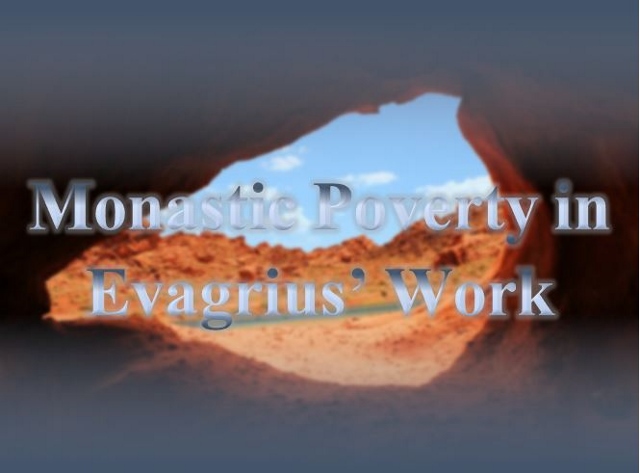Evagrius’s ideal monk lives simply, at the edge of poverty, so to speak, accumulating only enough to support himself and to provide basic hospitality to his guests; any surplus to this amount is to be given to the poor. Possessions, Evagrius argues, weigh down the monk, distract him from prayer, and exacerbate the irritable aspect …
Evagrius’s ideal monk lives simply, at the edge of poverty, so to speak, accumulating only enough to support himself and to provide basic hospitality to his guests; any surplus to this amount is to be given to the poor. Possessions, Evagrius argues, weigh down the monk, distract him from prayer, and exacerbate the irritable aspect of his soul. Evagrius consistently encourages generosity to the truly poor, but such generosity threatens to send the monastic donor over the edge of self-sufficiency into poverty or at least some monks feared and the demon of Love of Money suggested. Evagrius wants the monk to cultivate a condition of economic vulnerability, which fosters a spiritual condition of dependence on God and openness to other people.’
Evagrius frequently exhorts the monk to renounce possessions. Like many Christian authors before and after him, Evagrius argues that “the person with out possessions enjoys the pleasure of a life free from cares,” but the person still attached to possessions suffers from continual anxieties about them. The attention that possessions claim of their owner divides the monk’s intellect and so distracts him from prayer and contemplation of God. Evagrius can employ a variety of metaphors for the danger that possessions pose to the monk, most of which convey his conviction that they restrain or hold the monk back from free ascent toward his heavenly goal. For example, possessions are like the cargo that sinks an overloaded ship, while the monk should be free to soar like an eagle.
More precisely, Evagrius does often refer to the monk choosing to be poor or to live in poverty, but what does he envision in practical terms? Not, surely, having absolutely nothing, and not having only the most basic necessities, for Evagrius himself clearly has a library, for example. Rather, the ideal monk seeks the kind of self-sufficiency that Athanasius had Antony model in the Life of Antony. As Athanasius presents his story, when Antony moves to his more remote retreat, in the inner mountain, he at first relies on others to bring him supplies of bread. But eventually Antony plants a garden and is able to produce his own bread, and then he rejoices that he will no longer be a burden to anyone. He then grows some vegetables to provide hospitality to his guests. Antony’s support of himself and his provision for guests represent strategies by which Antony configures a proper form of monastic independence from and connection to the wider soci ety.” Echoing Athanasius, Evagrius instructs the monastic beginner, “Give thought to working with your hands, if possible both night and day, so that you will not be a burden to anyone, and further that you may be able to offer donations, as the holy apostle Paul advised” (meaning most likely 1 Thess. 2:9; 2 Thess. 3:8).
ety.” Echoing Athanasius, Evagrius instructs the monastic beginner, “Give thought to working with your hands, if possible both night and day, so that you will not be a burden to anyone, and further that you may be able to offer donations, as the holy apostle Paul advised” (meaning most likely 1 Thess. 2:9; 2 Thess. 3:8).
The monk, then, should have only enough to support himself and to provide charity to others. This principle means that the monk must have a business life based on his manual labor; Evagrius worked as a calligrapher, but the weaving of baskets appears to have been the most popular monastic trade. Evagrius admits, however, that buying and selling merchandise inevitably entangle the monk in sin, and so he suggests that the monk never bargain about prices and instead resign himself to taking a small loss in every transaction. Better yet, the monk should employ “some other trustworthy person” as his business agent, and so leave the haggling to him.
At first glance the twin goals of self-sufficiency and charity seem clear enough, but they raise several questions and present complications that do not trouble the person who simply seeks to make himself as rich as possible. In other words, despite what Evagrius says, the renunciation of possessions does not simply eliminate cares about them; it also introduces new cares. What constitutes self-sufficiency? To what extent should the monk secure his economic future? What if he cannot support himself because of sickness or old age? And what are the limits to the monk’s obligation to give to others? If giving to the poor is a good thing, would it not be better to give more, thus justifying more ambitious business activities? Questions like these provide the raw material for the demon of the Love of Money, perhaps the craftiest of the eight demons that make war on the Evagrian monk. As Evagrius presents it in the Praktikos, Love of Money preys primarily on the fragility of self-sufficiency. “Love of Money,” he writes, “suggests an extended period of old age when one’s hands will be too weak to work, future famines and the accompanying diseases, the bitterness of poverty, and that it is shameful to receive what one needs from other people”. These anxieties appear in other works as well and indicate a general insecurity about the future, and they are not groundless. His work titled Talking Back, is peppered with references to monks who are truly impoverished because, for example, illness has prevented them from working. Here these truly poor monks appear as potential recipients of the monk’s almsgiving, a theme to which I will return, but such monks also provide vivid incarnations of what every monk might face. And thus Love of Money seeks to persuade the monk to work more and set aside money and provisions for the proverbial rainy day and especially for an extended period of old age. Evagrius attempts to counter such thoughts with biblical verses that encourage trust in and dependence on God” The Lord will not withhold good things from those who walk in innocence” (Ps. 83:12) and that stress the fleeting nature of human life; “A human being is like vanity; his days pass by as a shadow” (Ps. 143:4). Place your trust in God, Evagrius says, and understand that to be human is to be contingent and insecure in the face of the future. When Love of Money targets the monk’s economic self-sufficiency, then, it exploits the temporal dimension of human life. This aspect of the demon’s attack finds its summation in this passage from Talking Back: Love of Money “suggests to our intellect either the remembrance of money that we have renounced, or the effort that we are making to acquire things that at present cannot be seen, or the preservation and safekeeping of the things we have now”. That is, Love of Money seeks to redirect the monk’s attention to the past that he has left behind and to saddle him with regret; calls into question the rewards of the kingdom of God and knowledge of God that lie in the future; or encourages the preservation of what the monk has at the present time.
Love of Money tries to turn economic self-sufficiency, a monastic good, into spiritual or existential self-sufficiency, the monastic vice of pride. The demon suggests that the monk should secure his future by his own efforts rather than accept his temporal nature and trust in God for his future. From this perspective, we see that the monk’s economic self-sufficiency certainly has the practical aim of not making the monk a burden on others, as Evagrius says explicitly, but it also has the disciplinary goal of fostering in the monk a spiritual condition of dependence on God. Evagrius writes, “Having therefore what you need for the present time, do not worry about the future, whether that be a day, a week, or some months. When tomorrow has arrived, that time will provide what is needed, as long as you are seeking above all for the kingdom of God and his righteousness.“ The monk should seek economic sufficiency, not economic security. Sufficiency represents a state of vulnerability.
But self-sufficiency is not the only principle guiding the monk’s relationship with money; the other is charity to others. “The one who consoles the poor,” Evagrius writes, “is manly in pious acts” Here too Love of Money finds plenty of complications to exploit, for the monk must learn to give generously without making generosity his primary project. Already in Foundations of the Monastic Life, a work aimed at beginners, Evagrius must command, “Do not desire to possess riches in order to make donations to the poor, for this is a deception of the evil one that often leads to vainglory and casts the mind into occasions for idle preoccupations” Instead, he suggests for his reader the widow with two mites from the Gospel of Mark (12:41-44): the monk need only give his small surplus to fulfill his charitable obligation.
For Evagrius even charity for the poor is a secondary good, subordinate to the monk’s goal of pure prayer and, ultimately, knowledge of the Trinity. To reach that goal, the monk must create in himself or herself a spiritual condition of reliance on God and openness to others. It is this spiritual vulnerability and generosity that economic vulnerability and generosity are meant to cultivate.
Join Us: Sign Up Today!
Tags:











